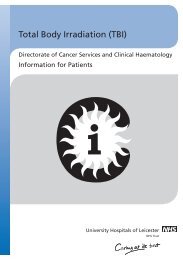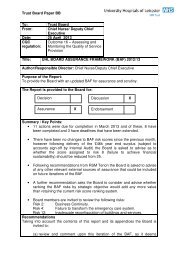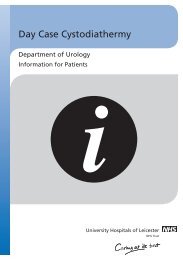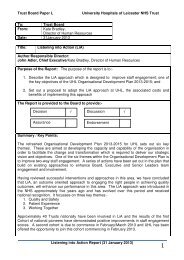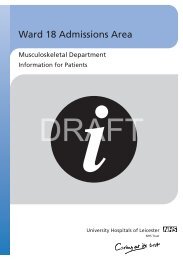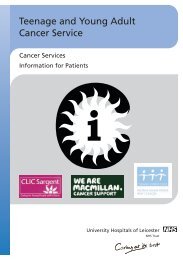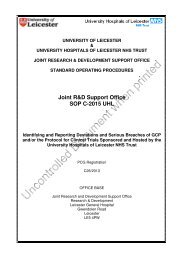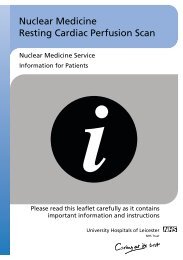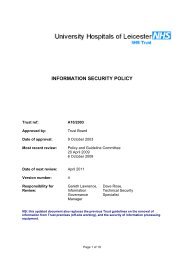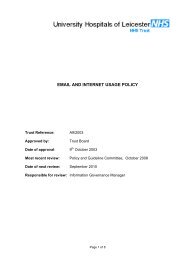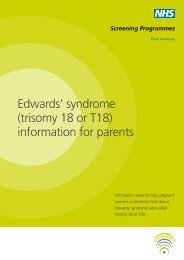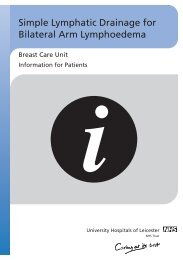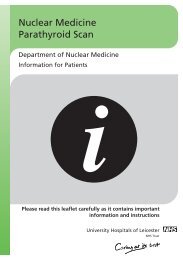Adjustments and Developments of Roles for Non ... - Library
Adjustments and Developments of Roles for Non ... - Library
Adjustments and Developments of Roles for Non ... - Library
Create successful ePaper yourself
Turn your PDF publications into a flip-book with our unique Google optimized e-Paper software.
POLICY FOR THE ADJUSTMENT ANDDEVELOPMENT OF ROLES FORNON-REGISTERED STAFFApproved By : Pr<strong>of</strong>essional Advisory ForumClinical Governance ExecutiveDate : January 2003Review Date : January 2004 (extended to July 2006)Originator : U.H.L. Policy GroupTrust Reference : B1/2003
UNIVERSITY HOSPITALS OF LEICESTERTHE POLICY FOR ADJUSTMENTS AND DEVELOPMENTS OFROLES FOR NON-REGISTERED STAFF1. INTRODUCTIONThis document sets out the University hospitals <strong>of</strong> Leicester (U.H.L.)N.H.S TrustsPolicy <strong>for</strong> <strong>Adjustments</strong> <strong>and</strong> <strong>Developments</strong> in the role <strong>and</strong> responsibility <strong>of</strong> non-Registered staff. The policy gives directives <strong>for</strong> the safe <strong>and</strong> effective provision <strong>of</strong>patient care <strong>and</strong> recognises the development <strong>of</strong> new <strong>and</strong> innovative roles, <strong>and</strong> newways <strong>of</strong> working (D.O.H. 2001). Staff who are currently undertaking an adjusted ordeveloped role should, in collaboration with their pr<strong>of</strong>essional head, ensure thatsupporting policies, procedures <strong>and</strong> training as set out below are developed <strong>and</strong>implemented as soon as possible.Collaboration <strong>and</strong> co-operation between all staff in the day to day management <strong>of</strong>exp<strong>and</strong>ed roles is essential. A flexible st<strong>and</strong>ardised approach, <strong>and</strong> the recognition<strong>of</strong> the needs <strong>for</strong> negotiation between the multi-disciplinary team <strong>and</strong> pr<strong>of</strong>essionalgroups about parameters <strong>of</strong> practice <strong>and</strong> teamwork, will enhance the benefit <strong>of</strong>patients. This policy reflects the emphasis upon Role development <strong>and</strong> new ways<strong>of</strong> working within making a Difference (DOH 1999), <strong>and</strong> the NHS plan (DOH 2000).2. BACKGROUNDThe N.H.S. plan endorsed the need to change the way staff work <strong>and</strong> the way theyare managed in order to deliver modern patient centred services. Themodernisation agenda also heralds a new division <strong>of</strong> labour with the introduction <strong>of</strong>new roles throughout the clinical pr<strong>of</strong>essionals <strong>and</strong> new classes <strong>of</strong> multi-skilledpractitioners. Hence, clinical work will now be organised to enable staff to exercisethe full range <strong>of</strong> their knowledge <strong>and</strong> skills to the advantage <strong>of</strong> the patient.Over the last decade expansion <strong>of</strong> nursing <strong>and</strong> therapy roles have evolved inresponse to a complex mixture <strong>of</strong> pressures from a pr<strong>of</strong>essional <strong>and</strong> politicalperspective (Cameron 2000, Humphries <strong>and</strong> Masterton 2000). Expansion <strong>and</strong>development <strong>of</strong> pr<strong>of</strong>essional roles <strong>and</strong> their support staff are there<strong>for</strong>e consideredan important part <strong>of</strong> service development within the Trust, <strong>and</strong> complement theChanging Work<strong>for</strong>ce Programme pilot projects. As with any change it is essentialthat such role developments are carefully planned, managed, supported <strong>and</strong>evaluated.1
3. AUTHORISED STAFF3.1 All staff who develop <strong>and</strong> exp<strong>and</strong> their role will be employed to work clinically in asupportive partnership with a registered practitioner.3.2 Support staff must:• Only develop their role in relation to the designated area <strong>of</strong> clinical work.• Have undertaken appropriate training <strong>for</strong> the identified role development <strong>and</strong> becompetent to practice. (see section 5).• Accept responsibility <strong>for</strong> their actions.• Maintain up to date knowledge <strong>and</strong> skills required <strong>for</strong> the role.• Be familiar with <strong>and</strong> demonstrate an underst<strong>and</strong>ing <strong>of</strong> all relevant policies <strong>and</strong>procedures relating to their clinical role.4. THE DEVELOPMENT AND EXPANSION OF SUPPORTIVE ROLES• The development <strong>and</strong> /or expansion <strong>of</strong> roles <strong>for</strong> support staff is essentiallyintroducing a clinical function not normally undertaken by non-registeredpersonnel. <strong>Developments</strong> in practice should stem from changes <strong>and</strong> innovationsin health care based on a sound body <strong>of</strong> knowledge <strong>and</strong> research, <strong>and</strong> to meetservice need.• Registered Practitioners must be satisfied that each aspect <strong>of</strong> the roleexpansion is directed to meeting the needs <strong>and</strong> serving the interest <strong>of</strong> thepatient as identified in a comprehensive needs assessment.• Registered Practitioners must also ensure that enlargement or adjustment <strong>of</strong> thesupport role must be achieved without compromising or fragmenting existingfundamental aspects <strong>of</strong> care.• All support staff wishing to develop their role must ensure that they will have theopportunity to undertake the skills required in practice on a regular basis.• Inappropriate delegation <strong>and</strong> substitution from <strong>and</strong> to others, whichcompromises patient care <strong>and</strong> pr<strong>of</strong>essional practice, must be avoided.• Ongoing evaluation <strong>and</strong> audit <strong>of</strong> the role development must be undertaken bythe appropriate clinical area, in collaboration with the clinical st<strong>and</strong>ards <strong>and</strong>monitoring team, <strong>and</strong> based upon st<strong>and</strong>ards <strong>and</strong> outcomes.• A comprehensive Risk Assessment should be undertaken in collaboration with aclinical Risk Advisor.2
5. THE PROCEDURE FOR THE DEVELOPMENT OF ROLES FOR SUPPORTSTAFF (figure 1)• Practitioners <strong>and</strong> managers wishing to introduce or develop an exp<strong>and</strong>edsupport role must initially discuss the proposed change with their pr<strong>of</strong>essionalhead, line manager <strong>and</strong>/or appropriate clinical lead within their specificdirectorate.• Collaboration <strong>and</strong> negotiation between the pr<strong>of</strong>essional groups <strong>and</strong> the multidisciplinaryteam regarding the parameters <strong>of</strong> practice is essential.• An initial proposal should be developed <strong>and</strong> submitted to Senior Nurse, ClinicalPractice Development (Nursing) <strong>and</strong> pr<strong>of</strong>essional head(other pr<strong>of</strong>essionals)who will advise on the membership <strong>of</strong> a working group, facilitate the way<strong>for</strong>ward, <strong>and</strong> assist in the development <strong>of</strong> policies <strong>and</strong> guidelines to supportpractice.• In collaboration with the Trust’s Education Forum, a competency based training<strong>and</strong> assessment programme will be developed, <strong>and</strong> subsequently approved.• The finalised policy <strong>and</strong> practice guidelines will be presented to the Pr<strong>of</strong>essionalAdvisory Forum(Nursing), or clinical support services <strong>for</strong>um (AHP <strong>and</strong>Radiographers) <strong>for</strong> discussion <strong>and</strong> agreement <strong>and</strong> Clinical Governanceexecutive (as appropriate) <strong>for</strong> final ratification.• Once approved the exp<strong>and</strong>ed role will be entered on the Trust’s Support Roledatabase in the Directorate <strong>of</strong> Nursing/ clinical support services.• Once approved, the policy details will be entered on the Trust’s Policy Registerwithin the Corporate <strong>and</strong> Legal Affairs Directorate.• Any additional adjustments or changes must be submitted to the ratifying bodiesabove <strong>for</strong> further approval.• An annual review <strong>of</strong> the role must be undertaken by the initial working group.• The role development should be shared <strong>and</strong> disseminated both internally <strong>and</strong>externally.6. EDUCATION AND TRAININGStaff wishing to develop their practice must:• Have completed a Trust approved competency based Training <strong>and</strong> Assessmentprogramme <strong>and</strong> follow the process set out in section 4.• Staff transferring from another Trust must provide evidence <strong>of</strong> the trainingprogramme undertaken <strong>and</strong> complete a summative practical assessment.• Have evidence <strong>of</strong> assessment <strong>and</strong> competency in their role adjustment, signedby an approved assessor.3
• Accept responsibility <strong>for</strong> updating skills <strong>and</strong> knowledge, as appropriate. Thereis an expectation that the activity will be undertaken on a regular basis tomaintain competence.• The requirement <strong>for</strong> record keeping in relation to when training is undertaken<strong>and</strong> assessment completed lies with both the individual staff member <strong>and</strong> theDirectorate.7. LEGAL LIABILITYThe Trust as an employer, will assume vicarious liability <strong>for</strong> the actions <strong>of</strong> all staff,including those on honorary contracts, providing that:• Staff have undergone any training identified as necessary <strong>for</strong> the development<strong>of</strong> the role.• An appropriate policy <strong>and</strong> procedure has been agreed <strong>and</strong> followed, <strong>and</strong> thatthe member <strong>of</strong> staff has been fully authorised by the Trust to undertake therole.• The provision <strong>of</strong> this policy has been followed by the member <strong>of</strong> staff at alltimes.4
REFERENCESCameron,A. (2000). “ New Role <strong>Developments</strong> in context”. In Developing new clinicalroles. Ed Humphries,D <strong>and</strong> Masterton, A . Churchill Livingstone.Humphries,D. Masterton,A (2000), Developing new clinical roles, ChurchillLivingstone.Department <strong>of</strong> Health (1999), Making a Difference, Department <strong>of</strong> Health, London.Department <strong>of</strong> Health (2000), The N.H.S. plan, Department <strong>of</strong> Health, London.Department <strong>of</strong> Health (2001), Changing Work<strong>for</strong>ce Programme, Human ResourceDirectors Bulletin.5
The Procedure <strong>for</strong> the Development <strong>of</strong> support rolesDefine Area <strong>of</strong> role <strong>and</strong> function to be Developed.Approval to proceed from appropriate pr<strong>of</strong>essional head/line manager, clinician <strong>and</strong> risk advisor.Prepare <strong>and</strong> submit an initial Proposal to Senior Nurse Clinical Practice Development.Set up a multi-pr<strong>of</strong>essional Working Group as advised by above.Develop Training <strong>and</strong> Assessment Programme in collaboration with Trust’s Education Forum.Submit Final Proposal <strong>and</strong> Practice Policy to Pr<strong>of</strong>essional Advisory Forum/clinicalsupport services <strong>for</strong>um <strong>and</strong> Clinical Governance ExecutiveDetails to be entered on the Trust’s Policy Register within the Corporate <strong>and</strong> LegalAffairs Directorate, <strong>and</strong> role database in nursing directorate/clinical support services.Implement Adjustment/Development <strong>of</strong> Role.On completion, prepare a report <strong>and</strong> present at Trust Forums.Publish Work <strong>for</strong> wider dissemination.Annual Update <strong>and</strong> Review by initial working group.6



